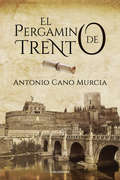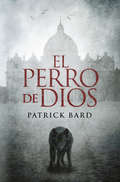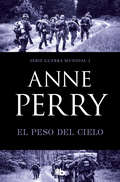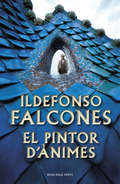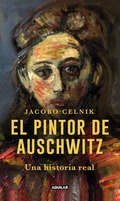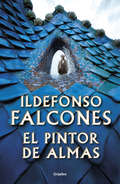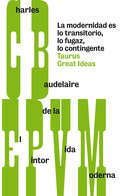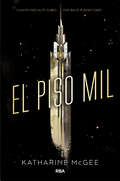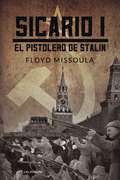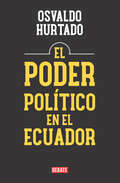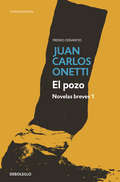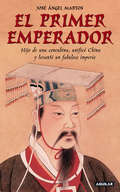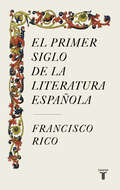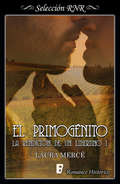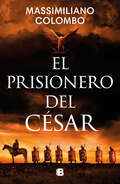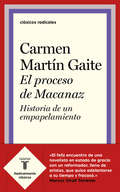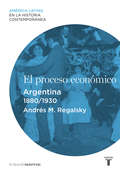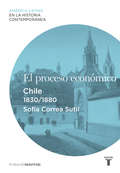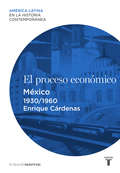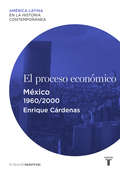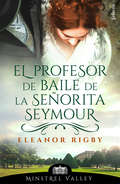- Table View
- List View
El perfume de los Céfiros
by Raquel Gil EspejoGranada, inicios del siglo XVII. El perfume de los céfiros, ese que guardaba los lugares en los que el viento era sonido y el sonido acababa convertido en canción, le trajo ese olor a jazmín que solo había exhalado en la piel canela de Guiomar. Simón crece junto a Juan Belvís, su abuelo, el conocido como el jardinero de la Alhambra. Su repentina muerte lleva a Simón a huir. Tras malvivir durante dos largos años en las calles de Granada, pasa a contar con la protección de Elvira de Sandoval, quien le dará la oportunidad de aprender y ejercer un oficio en el barrio de los Tintoreros. Guiomar es hija del mercader Gaspar de la Fuente y una de las tejedoras más prometedoras de toda Granada. De cabello largo, del color de la noche, y ojos verdes, Simón se queda prendado de su belleza en el mismo instante en el que sus caminos se cruzan por primera vez, en la plaza de Bibarrambla. Un amor inocente y sincero, que se topa con la oposición frontal del mercader, nace entre los dos jóvenes. Sin embargo, sus caminos se separan de modo abrupto, con la vida de Simón pendiendo de un hilo y la de Guiomar a manos de un padre cruel y déspota. El joven es trasladado a la ciudad de Toledo, donde consigue recuperarse de las heridas. Simón adquiere otra identidad y una nueva vida, alejado de odios; pero también de Guiomar de la Fuente, a quien pertenece su corazón. Habrán de pasar siete años hasta que Simón decida retornar a su Granada natal y lo hará con el firme propósito de buscar a Guiomar, cuyo recuerdo siempre lo ha acompañado. Pero... ¿qué habrá sido de la joven tejedora? ¿Habrá tenido libertad para tomar sus propias decisiones, o habrán sido otros quienes hayan movido los hilos de su destino, condenándola en vida? ¿Habrá olvidado a ese muchacho que la observaba como nunca nadie lo había hecho o, por el contrario, sus sentimientos continuarán muy latentes debajo de esa piel canela que Simón siempre amó?
El pergamino de Trento
by Antonio Cano Murcia¿Quiere conocer la última de las intrigas del Vaticano? La sucesión a la Silla de Pedro no contaba con la existencia del acta de la última sesión del Concilio de Trento. Su descubrimiento tendrá consecuencias imprevisibles para la Curia Romana.
El perro de Dios
by Patrick BardS. XVIII. Una realidad silenciada por la Iglesia. Un sacerdote que hará lo imposible por revelar un secreto oculto desde hace demasiado tiempo... Roma, 1798. Los bibliotecarios del Vaticano, entre los que se encuentra el sacerdote francés Antonin Fages, intentan salvar algunos de los libros prohibidos más preciados, de valor incalculable, de las tropas de Napoleón prestas al saqueo. Cuando uno de los bibliotecarios es abatido por un disparo, Antonin logra recuperar, pese al terror que le invade, el libro que escondía la víctima. El joven sacerdote tiene en sus manos un documento sorprendente que muchos hombres de la Iglesia y de la política quisieran destruir. En él se cuenta una realidad enmascarada durante mucho tiempo: la verdadera existencia de un ser sanguinario, apodado la Bestia, que destroza a sus víctimas y de quien se decía que tan solo era una superstición. Ahora el padre Antonin sabe que se trata de un serreal sediento de sangre, de una criatura que ha sembrado la tierra de cadáveres mutilados. Pero es una verdad que pone en peligro su vida y le obliga a huir a Francia para encontrar pruebas definitivas y deshacerse de sus perseguidores. Patrick Bard firma una intriga escalofriante. Una novela que arrastra al lector a Gévaudan, una fría región del sudeste de Francia, y al miedo de una época marcada por las creencias populares, los asesinatos impunes y los abusos de poder. Reseñas:«Una nueva perspectiva sobre un tema famoso, el de la Bestia de Gévaudan. La genialidad de Patrick Bard consiste en dar a conocer lo que jamás había sido expuesto antes: el papel de la Iglesia. El perro de Dios es una lectura indispensable.»L'Humanité «Un libro escrito de forma maravillosa. La belleza salvaje de algunos pasajes resulta sobrecogedora.»Revue Alibis
El peso del cielo (Primera Guerra Mundial #Volumen 2)
by Anne PerryCon la veracidad y riqueza de detalles que caracterizan a sus novelas de corte victoriano, Anne Perry retrata con humanismo el día a día de aquellos que participaron en la Gran Guerra. Abril de 1915. La Primera Guerra Mundial sigue su implacable marcha. Entre las tropas británicas enviadas al frente, se hallan los hermanos Reavley. Joseph, el mayot de los tres, ejerce de capellán en las trincheras, mientras que Judith es conductora y traductora del general que está al mando del ejército británico. Matthew también participa en los acontecimientos históricos desde su puesto en los servicios de inteligencia en Londres. Tanto Joseph como él siguen investigando la extraña muerte de sus padres, hecho que asocian con un posible complot internacional y en el que dos de las potencias mundiales, Inglaterra y Alemania, estarían involucradas. Además de la incógnita en tomo a sus progenitores y de tener que hacer frente a la dura experiencia de la contienda, Joseph intenta descubrir quién asesinó a Eldon Prentice, un corresponsal de guerra inglés que se había ganado la antipatía de muchos.
El pintor d'ànimes
by Ildefonso FalconesDesprés de vendre més de 10 milions d'exemplars, Ildefonso Falcones torna amb una novel·la fascinant. Una poderosa història d'amor, passió per l'art, revoltes socials i venjança a la Barcelona modernista. Barcelona, 1901. La ciutat viu dies de gran agitació social. L'absoluta misèria dels més desfavorits contrasta amb l'elegant opulència de les grans avingudes, on destaquen alguns edificis singulars, símbol de l'arribada del modernisme. En Dalmau Sala, fill d'un anarquista ajusticiat, és un jove pintor que viu atrapat entre dos móns. D'una banda, la seva família i l'Emma, la dona que estima, són fermes defensores de la lluita obrera; homes i dones que no coneixen la por a l'hora d'exigir els drets dels treballadors. De l'altra, la seva feina en el taller de ceràmica del senyor Bello, el seu mentor i un conservador burgès de fèrries creences catòliques, l'acosta a un ambient on imperen la riquesa i la innovació creativa. Així, seduït per les ofertes temptadores d'una burgesia disposada a comprar la seva obra i la seva consciència, en Dalmau haurà de trobar el seu autèntic camí, com a home i com a artista, i allunyar-se de les nits d'alcohol i drogues per a descobrir el que de debò li importa: els seus valors, la seva essència, l'amor d'una dona valenta i lluitadora i, sobretot, aquests quadres que brollen de la seva imaginació i capturen en un llenç les ànimes més miserables que deambulen pels carrers d'una ciutat agitada pel germen de la rebel·lia. Amb El pintor d'ànimes, Ildefonso Falcones ens ofereix la poderosa història d'una època convulsa alhora que ens brinda una trama emocionant en què l'amor, la passió per l'art, la lluita pels ideals i la venjança es combinen magistralment per recrear una Barcelona, sòbria i grisa en el passat, que ara s'encaminacap a un futur brillant en què el color i l'esperança comencen a estendre's per les cases i els carrers. El que la crítica ha dit sobre L'església del mar:«De Barcelona ja coneixíem la Sagrada Família, la delirant catedral de l'arquitecte Gaudí. Ara, L'església del mar d'Ildefonso Falcones, com Notre-Dame de París de Víctor Hugo, ens ofereix la història d'una ciutat i un poble.»Le Figaro «Un best seller per a la catedral del poble.»Catalina Serra, El País «Un gran fulletó. Una prosa enèrgica... Falcones té una habilitat especial per al detall... i els seus personatges són de carn i ossos... Una història fascinant.»The Washington Post Sobre La mà de Fàtima:«Manté l'expectació del lector, s'aparta del previsible, s'acosta a l'ideari dels autors francesos i italians (passió, revenja, esperança i justícia) i atrapa l'interès amb diverses subtrames que actuen comllibres en cadena.»Ramon Ventura, El Periódico Sobre La reina descalça:«Falcones s'ha consagrat com l'autor espanyol de novel·la històrica més venut arreu del món.»El País Sobre Els hereus de la terra:«Deia Kipling que l'artesania està sempre en la base de tot gran art. Tal apreciació ens ha rondat mentre llegíem la cabalosa (i molt treballada) segona part de L'església del mar. [...] Una bona novel·la històrica que aconsegueix submergir el lector en atmosferes del passat. [...] Una seqüela a l'altura de la seva obra matriu.»Carles Barba, Cultura/S, La Vanguardia «El millor de la novel·la radica en la creació del món gairebé màgic d'una Barcelona que encara es pot reconèixer, però el passat de la qual es desconeix. Falcones el revela, el fa atractiu i l'acosta a nosaltres en un joc de paral·lelismes intel·ligent. Aquests paral·lelismes, al costat d'una espectacular recreac
El pintor de Auschwitz
by Jacobo CelnikJacobo Celnik ha navegado por las aguas turbulentas del pasado familiar para descubrir sus secretos y resolver los misterios que llevaron a los Celnikier a fragmentarse por cuenta del antisemitismo polaco y del horror del Holocausto. Jacobo Celnik ha navegado por las aguas turbulentas del pasado familiar para descubrir sus secretos y resolver los misterios que llevaron a los Celnikier a fragmentarse por cuenta del antisemitismo polaco y del horror del Holocausto. El autor descubrió las piezas faltantes de su familia para cerrar un círculo que su bisabuelo dejó abierto cuando decidió emigrar a Colombia a inicios de los años treinta del siglo XX. Con una narración imparable y una investigación rigurosa que llevó al autor a indagar en archivos familiares y estatales ?ubicados en Francia, Polonia, Alemania y Colombia?, y a tocar fibras sensibles, como siempre sucede cuando se escarba en el pasado familiar, este libro permite entender cómo fue el arribo de la comunidad judía polaca a Colombia ad portas de la Segunda Guerra Mundial, con todas las complejidades que implica llegar a una tierra desconocida resistente a la inmigración, y es, también, un estremecedor relato de supervivencia que absorbe al lector y que nos recuerda la tragedia que millones de judíos tuvieron que padecer.
El pintor de Flandes
by Rosa RibasHistoria, intrigas palaciegas, suspense y un cuadro real que custodia el Museo del Prado tienen cita en esta novela que reconstruye la corte de Felipe IV, sus dificultades para gobernar y el Madrid del Siglo de Oro.Corre el año 1622. El joven Paul van Dyck, hermano adoptivo del célebre Anton van Dyck, acepta un encargo que podría ser decisivo para su carrera: pintar un lienzo de dimensiones colosales para el conde de Villamediana, Correo Mayor de Felipe IV. Abandona el taller de Rubens en Amberes para instalarse en Madrid, en casa de su mecenas, con la esperanza de alcanzar la fama aunque las condiciones en las que ha de realizar el cuadro son, cuando menos, extrañas: nadie debe saber qué hace en casa del conde y, mucho menos qué está pintando...«Como novelista policíaca, su trabajo tiene un aire a P.D. James, con escenas muy bien construidas y una atención constante a la cotidianidad y la psicología de las pequeñas cosas.» La Vanguardia
El pintor de almas
by Ildefonso FalconesDespués de vender más de 10 millones de ejemplares, Ildefonso Falcones vuelve con una fascinante novela. Una poderosa historia de amor, pasión por el arte, revueltas sociales y venganza en la Barcelona modernista. Barcelona, 1901. La ciudad vive días de gran agitación social. La oscura miseria de los más desfavorecidos contrasta con la elegante opulencia de las grandes avenidas, donde ya destacan algunos edificios singulares, símbolo de la llegada del Modernismo. Dalmau Sala, hijo de un anarquista ajusticiado, es un joven pintor que vive atrapado entre dos mundos. Por un lado, su familia y Emma, la mujer que ama, son firmes defensores de la lucha obrera; hombres y mujeres que no conocen el miedo a la hora de exigir los derechos de los trabajadores. Por otro, su trabajo en el taller de cerámica de don Manuel Bello, su mentor y un conservador burgués de férreas creencias católicas, lo acerca a un ambiente donde imperan la riqueza y la innovación creativa. De este modo, seducido por las tentadoras ofertas de una burguesía dispuesta a comprar su obra y su conciencia, Dalmau tendrá que encontrar su auténtico camino, como hombre y como artista, y alejarse de las noches de vino y drogas para descubrir lo que de verdad le importa: sus valores, su esencia, el amor de una mujer valiente y luchadora y, sobre todo, esos cuadros que brotan de su imaginación y capturan en un lienzo las almas más miserables que deambulan por las calles de una ciudad agitada por el germen de la rebeldía. Con El pintor de almas, Ildefonso Falcones nos ofrece la poderosa historia de una época convulsa al tiempo que nos brinda una trama emocionante donde el amor, la pasión por el arte, la lucha por los ideales y la venganza se combinan con maestría para recrear una Barcelona, antaño sobria y gris, que ahora se encamina haciaun futuro brillante donde el color y la esperanza empiezan a extenderse por sus casas y sus calles. Lo que ha dicho la crítica sobre La catedral del mar:«De Barcelona ya conocíamos la Sagrada Familia, la delirante catedral del arquitecto Gaudí. Ahora, La catedral del mar de Ildefonso Falcones, como Notre-Dame de París de Víctor Hugo, nos ofrece la historia de una ciudad y un pueblo.»Le Figaro «Un best seller para la catedral del pueblo.»Catalina Serra, El País «Un gran folletín. Una prosa enérgica. Falcones tiene una mirada especial para el detalle y sus personajes son de carne y hueso. Una historia fascinante.»The Washington Post Sobre La mano de Fátima:«Mantiene la expectación del lector, rehúye lo previsible, se acerca al ideario de los autores franceses e italianos (pasión, desquite, esperanza y justicia) y captura el interés con múltiples subtramas que actúan como libros en cadena.»Ramon Ventura, El Periódico Sobre La reina descalza:«Falcones se ha consagrado como el autor español de novela histórica más vendido en el mundo.»El País Sobre Los herederos de la tierra:«Decía Kipling que la artesanía está siempre en la base de todo gran arte. Tal apreciación nos ha rondado mientras leíamos la caudalosa (y muy trabajada) segunda parte de La catedral del mar. [...] Una buena novela histórica que logra sumergir al lector en atmósferas del pasado. [...] Una secuela a la altura de su obra matriz.»Carles Barba, Cultura/S, La Vanguardia «Lo mejor de la novela radica en la creación del mundo casi mágico de una Barcelona aún reconocible, pero cuyo pasado se desconoce. Falcones lo desvela, lo hace atractivo y lo acerca en un inteligente juego de paralelismos. Esos paralelismos, junto a una espectacular recreación, hacen
El pintor de la vida moderna (Serie Great Ideas #28)
by Charles BaudelaireIdeas que han cambiado el mundo A lo largo de la historia, algunos libros han cambiado el mundo. Han transformado la manera en que nos vemos a nosotros mismos y a los demás. Han inspirado el debate, la discordia, la guerra y la revolución. Han iluminado, indignado, provocado y consolado. Han enriquecido vidas, y también las han destruido. Taurus publica las obras de los grandes pensadores, pioneros, radicales y visionarios cuyas ideas sacudieron la civilización y nos impulsaron a ser quienes somos. Poeta, esteta y hedonista, Baudelaire fue además uno de los más revolucionarios críticos de arte de su época. Aquí profundiza en la belleza, la moda, el dandismo, el propósito del arte y el papel del artista, y describe al pintor que, en su opinión, expresa de un modo más pleno el drama de la vida moderna. Comentarios sobre la colección Great Ideas: «De veras que la edición es primorosa y pocas vecescontenido y continente pueden encontrarse mejor ensamblados y unidos. ¡Qué portadas! Para enmarcar. [...] Ante las Great Ideas, solo cabe quitarse el sombrero. ¡Chapeau!» ABC «Taurus propone un doble envite con este lanzamiento. Por un lado aumenta su compromiso con el ensayo; por otro, recupera el gusto por la estética. A los volúmenes se les ha proporcionado una portada delicada y cuidada (copian el original británico) que invita a la lectura.»La Razón «Un fenómeno editorial.»The Guardian «Aparte de los contenidos, en general muy bien elegidos, son tan bonitos que si los ven seguro que cae alguno.»El País «Ideas revolucionarias, crónicas de exploraciones, pensamientos radicales... vuelven a la vida en estas cuidadísimas ediciones, muy atractivas para nuevos lectores.»Mujer Hoy «Grandes ideas bien envueltas. De Cicerón a Darwin, esta colección entra por los ojos.»Rolling Stone «Original y bella iniciativa la emprendida por Taurus con su colección Great Ideas.»Cambio 16 «Hay libros inmortales, libros únicos que contienen pensamientos y reflexiones capaces de cambiar el mundo, tesoros en miniatura reagrupados en la colección Great ideas.»Diario de León
El piso mil: Cuanto más alto subes, más bajo puedes caer (El piso mil #Volumen 1)
by Katharine McGeeSobrevivir en la cima del mundo tiene un precio que no todos están dispuestos a pagar. Año 2118, una supertorre se alza sobre el skyline de Nueva York. Es una sociedad en sí misma, en la que las plantas superiores están habitadas por familias inmensamente ricas, mientras que en las inferiores subsisten las clases más bajas. La caída de una chica desde lo más alto amenazará con sacar a la luz los secretos de sus habitantes: mentiras, excesos, traición, amores prohibidos... que harán temblar los mismos cimientos de la torre. Entre el lujo sofisticado y la tecnología más avanzada, un grupo de jóvenes tendrá que encontrar su lugar en lo más alto.
El pistolero de Stalin: Sicario I
by Floyd Missoula<P>Esta novela es un tiro. El pistolero de Stalin es una narración seria, una novela histórica donde unos personajes de ficción conviven con personajes reales dentro de unos acontecimientos auténticos, la Revolución bolchevique. Es por tanto una novela de ficción de principio a fin. Tiene un poco de todo, acción, violencia, aventura, una pizca de sexo, amor y misterio. <P>Un tren llega a París en enero de 1952. Uno de sus pasajeros, James Malory, es un inglés con deseos de convertirse, como otros muchos, en escritor de éxito. Tiene veintiocho años, busca en la Ciudad de la luz la inspiración necesaria para conseguir sus propósitos. Su padre ha sido uno de los hombres más ricos del Reino Unido. Su madre, una dama virtuosa y cariñosa con él, lo crió de pequeño entre algodones en un mundo de abundancia. James, cuando llega a la adolescencia, quiere ser periodista, políglota, viajero y aventurero. Su padre no se lo permite y le obliga a estudiar Derecho para que un día se haga cargo de los negocios. El muchacho se convierte en un voraz lector. Le entusiasma Steinbeck. En poco tiempo queda huérfano de padre y madre. <P>Piensa que ha llegado el momento de cumplir su sueño, el de ser escritor. Se traslada a París. En París se instala en el Barrio Latino. Se empapa de toda la belleza de la ciudad. Se empapa también de sabiduría, de cultura y de vida. El aroma de París es inigualable y encantador. Conoce gente, rompe corazones y busca desesperadamente un tema sobre el que empezar a escribir. Conoce a una condesa rusa que ejerce la prostitución. Le lleva a garitos rusos donde le cuentan historias de la revolución, del zar, de la gran duquesa Isabel, hasta que aparece un nombre: Lavrenti Pavlovich, uno de los criminales más abyectos de toda la historia de la humanidad. <P>Para escribir sobre su vida se traslada a Moscú, conoce al espeluznante personaje y empieza su primera obra. Lavrenti Pavlovich nació en la más absoluta pobreza. Poco antes de la Revolución bolchevique se apuntó en el Partido y comenzó su carrera criminal. A golpe de gatillo fue ascendiendo hasta convertirse en sicario, pistolero y delfín de Stalin. Nadie escapó de sus criminales instintos, ni siquiera su propia familia. Al morir el dictador, Lavrenti Pavlovich era el gallo del corral. Pensaba que nadie se atrevería a enfrentarse con él, pero en el corral había una astuta zorra, Nikita Kruschev. Lavrenti menospreció a Nikita, y esa fue su perdición.
El poder del pueblo: ¿Cómo funciona nuestro gobierno? (Relatos estadounidenses)
by DKInspira jóvenes curiosos a explorar las instituciones estadounidenses a lo largo de la historia de la nación y cómo es la vida en EE. UU. hoy en díaParte de una serie inspirante que apoya el aprendizaje acerca del gobierno y el civismo en un EE. UU. contemporáneo a través de eventos históricos y las personas que formaron los mismos. El poder del pueblo interconecta contexto,personalidades y eventos históricos y las experiencias de estadounidenses modernos. Ayudará los estudiantes a entender temas claves de estudios sociales, como los orígenes de instituciones y valores de EE. UU. y la relevancia que tienen a las vidas de jóvenes hoy. El libro explora las instituciones y los sistemas de gobierno estadounidenses como una república constitucional, y las razones por las mismas. Incluyen la función del Presidente, del Congreso, de la Corte Suprema, el gobierno estatal y otras entidades nacionales e internacionales. Temas y eventos históricos incluyen la Constitución estadounidense y enmiendas, elecciones y grandes Presidentes históricos
El poder político en el Ecuador
by Osvaldo HurtadoRelanzamiento de uno de los libros más importantes sobre historia política del Ecuador. Editado por primera vez en 1977, este clásico de la historia política ecuatoriana analiza la formación del poder en la Audiencia de Quito, la estructura del poder en la República y la crisis del poder en la época contemporánea. Este libro se convirtió en un best seller del cual se han publicado más de veinte ediciones y sigue siendo un referente sobre la historia del Ecuador.
El poder político en el Ecuador
by Osvaldo HurtadoRelanzamiento de uno de los libros más importantes sobre historia política del Ecuador. Editado por primera vez en 1977, este clásico de la historia política ecuatoriana analiza la formación del poder en la Audiencia de Quito, la estructura del poder en la República y la crisis del poder en la época contemporánea. Este libro se convirtió en un best seller del cual se han publicado más de veinte ediciones y sigue siendo un referente sobre la historia del Ecuador.
El pozo. Novelas breves 1 (Biblioteca Breve Ser.)
by Juan Carlos OnettiEste primer volumen de las novelas cortas de Juan Carlos Onetti reúne: El pozo (1939), Los adioses (1954), Para una tumba sin nombre (1959), La cara de la desgracia (1960) y Jacob y el otro (1961). Con la publicación de El pozo en 1939, Juan Carlos Onetti imprimía las primeras huellas de una trayectoria extraordinaria al tiempo que la literatura hispanoamericana abría sus puertas a una voz irrepetible. Este primer volumen de sus Novelas breves abarca un período de veintidós años a lo largo de los cuales el autor uruguayo consolidó e hizo inconfundible un estilo perpetrado en obras como las que aquí se reúnen: Los adioses (1954), Para una tumba sin nombre (1959) , La cara de la desgracia (1960) y Jacob y el otro (1961), además de su ya mentado debut narrativo. Sus páginas son el fruto amargo de la turbia pero hiriente mirada de unos ojos enfrentados alrostro mismo de la existencia y la condición humana. Reseñas:«Onetti sintetiza, simultáneamente, la precisión constructiva y lingüística de Borges y la pasión humana. Para mí, Onetti escribe en el límite del idioma.»Antonio Muñoz Molina «El más grande novelista latinoamericano.»Julio Cortázar
El primer emperador: Hijo de una concubina, unificó China y levantó un fabuloso imperio
by José Ángel MartosLa historia del primer emperador de Qin (siglo III a.C.), un personaje capital en la historia de China. Hijo de una concubina, no se sabe a ciencia cierta quién fue su padre. Qin Shihuang nació marcado por el destino. Vino al mundo en cautividad, vivió alejado de su tierra hasta los 8 años, ascendió al trono a los 13 y solo alcanzó el poder efectivo a los 22 tras un turbulento periodo de regencia. El primer emperador de Qin (siglo III a. C.) es un personaje capital en la historia de China. Fue el artífice de la unificación en un solo Estado del territorio que ocupaban los siete Reinos Combatientes. Abolió el feudalismo, dividió el imperio en treinta y seis provincias y bajo su reinado se desarrolló una extensa red de carreteras y canales que conectaban las provincias. Pero quizá la medida más importante fue la unificación de la escritura. Complacido por sus hazañas, se denominó a sí mismo «primer emperador». El primeremperador es recordado por las dos maravillas que legó a la posteridad: la Gran Muralla china y su monumental tumba.
El primer siglo de la literatura española
by Francisco RicoLa literatura española medieval, expuesta por una de las voces con mayor autoridad en lengua y literatura españolas. Una obra fundamental en el campo de las humanidades. A lo largo de los siglos, el ser humano ha experimentado con las posibilidades estéticas y expresivas del lenguaje, y las ha puesto al servicio de la dimensión primordial de la vida cotidiana y la historia de los pueblos a través del arte de contar. En esta obra imprescindible, Francisco Rico indaga en diversos géneros medievales para comprender las raíces de la literatura española. Su historia no es unívoca ni lineal; formas como la canción trovadoresca, los cantares de gesta o la poesía didáctica florecieron a raíz del contacto directo con otras tradiciones. Nuestra literatura creció desde el principio enlazada a otras culturas. El primer siglo de la literatura española es un análisis exhaustivo del modo en que las actitudes primarias y universales del ser humano se reflejan en el desarrollo de nuestras letras y nos permiten entender sus orígenes más inciertos.
El primogénito (La rendición de un libertino #Volumen 1)
by Laura MercéPrimera entrega de la trilogía «La rendición de un libertino». ¿Puede un pendenciero y redomado libertino transformarse en un hombre nuevo, cabal y responsable? Diego Ibáñez, a pesar de su hidalguía y sentido del honor, y pertenecer a la alta burguesía, no puede evitar ser el libertino que todos ven en él. Ser un verdadero donjuán desde la adolescencia lo lleva a ser protagonista de sucesivos escándalos amorosos y peligrosos duelos. Y esto genera un constante dolor de cabeza para toda su familia, más aún cuando es el heredero de las bodegas y el encarrilarlo por la buena senda es imposible de lograr. Durante un viaje a Inglaterra, Diego conoce a Brunilda, una mujer que logra lo que ninguna otra: que caiga rendido ante ella. Sin embargo, sus dotes seductoras no serán suficientes para ella, quien ya está comprometida con otro hombre. El tiempo seguirá su curso, pero Diego no se olvida de ella. Así, cumplirá con la promesa hecha a su padre de ser un hombre de provecho y buscar una digna esposa. Pero... ¿podrá un sujeto extravagante como él, acostumbrado a poner en relieve su incontenible vitalidad sensual y mantener relaciones con varias amantes, cambiar de la noche a la mañana y transformarse en alguien que nunca imaginó llegar a ser?
El prisionero del César
by Massimiliano ColomboNovela histórica sobre la campaña de las Galias que narra la amistad entre un centurión romano y el preso galo Vercingétorix, cuya ejecución fue una de las más famosas en los años de gloria de Julio César. Publio Sextio Baculo, primer centurión de la legión XII romana y héroe de la campaña de las Galias de Julio César, es relevado de su puesto tras perder varios dedos en la batalla de Atuatuca y devuelto a la capital, donde deberá custodiar el tesoro de Roma. Sin embargo, el largo historial de trifulcas que acumula desde su regreso lleva al joven magistrado de la República a cuyas órdenes responde a asignarle otra tarea: será el carcelero del líder de los galos, Vercingétorix, apresado en la batalla de Alesia. El caudillo de los arvernos permanecerá seis años encerrado en el pozo Tuliano de la cárcel Mamertina hasta que se ordene su ejecución. Durante ese largo cautiverio se forjará entre ellos una profunda amistad basada enel respeto mutuo y los recuerdos de la guerra. Las novelas de Massimiliano Colombo aúnan la pasión, la épica y el heroísmo propios de las grandes gestas romanas, con una brillante ambientación militar, marca de un autor que ya es referente para los apasionados del género. La crítica ha dicho sobre obras anteriores del autor:«Una novela histórica escrita con el rigor de los que conocen la profesión de las armas».Tiempo «No es una novela histórica sin más. Hay acción, aventuras, romance, intriga y asesinatos».Blog Anika entre libros «El autor crea una atmósfera magnífica. Las descripciones de la vida diaria, de las costumbres, de los vestidos, las comidas... son fabulosas».Blog La historia en mis libros «Consigue sumergirnos en el corazón y las almas de los legionarios que protagonizan la novela».Revista Krítica «Trepidante historia de épica y honor».Blog El placer de la lectura
El proceso de Macanaz: Historia de un empapelamiento
by Carmen Martín Gaite«El feliz encuentro de una novelista en estado de gracia con un reformador, lleno de aristas, que quiso adelantarse a su tiempo y fracasó.» <P><P>Marcos Giralt Torrente Un libro maravilloso e inclasificable en el que Carmen Martín Gaite, fascinada por el personaje y basándose en años de paciente labor en archivos, rastreó y contó con gran ingenio el enredado proceso seguido por la Inquisición a Melchor de Macanaz (1670-1760). La peripecia vital de este pensador tenaz, su progreso y caída en desgracia, muestra la fuerza que aún conservaba la Inquisición en pleno Siglo de las Luces, así como las intrigas cortesanas e internacionales en torno al rey Felipe V. Con este libro, Martín Gaite obtuvo el respaldo de los historiadores y del público. <P><P>Carmen Martín Gaite (Salamanca, 1925 - Madrid, 2000) fue una de las más importantes autoras españolas del siglo XX. Recibió premios como el Príncipe de Asturias de las Letras, elNacional de Literatura, el Nacional de las Letras o el Anagrama de Ensayo. Las novelas Entre visillos, Retahílas y El cuarto de atrás, y el ensayo Usos amorosos del XVIII en España son algunas de las obras de esta versátil escritora. <P><P>------------- radical: adj. Perteneciente o relativo a la raíz. «Clásicos Radicales» nace con la misión de recuperar algunos de los libros más emblemáticos del sello que en su día formularon una idea nueva u ofrecieron una mirada original y pertinente sobre las grandes cuestiones universales. Ausentes de las librerías durante demasiado tiempo pero recordados y buscados por los lectores más despiertos, estos textos esenciales de disciplinas como la filosofía, la ética, la historia, la sociología, la economía, la antropología, la psicología y la política mantienen su plena vigencia y vuelven hoy con fuerza para iluminar nuestro presente. -
El proceso económico. Argentina (América Latina en la Historia Contemporánea )
by Andrés M. RegalskyUn estudio sobre el marco econónico de Argentina de finales de siglo XIX y principios de siglo XX. De la mano de uno de los mejores expertos en el tema se analiza este período económico en Argentina, marcado por una economía capitalista en expansión y cómo los cincuenta años subsiguientes marcaron logros aún más importantes: un crecimiento económico de los mayores del mundo. La colección América Latina en la Historia Contemporánea es uno de los proyectos editoriales más importantes de las últimas décadas y una aportación original y novedosa a la historiografía sobre América Latina en la que han participado más de 400 historiadores de diversos países. Presenta una visión plural y accesible de la historia contemporánea de las naciones latinoamericanas -incluyendo aquellas otras, europeas o americanas, que más han aportado a su materialización- y revela las claves políticas, sociales, económicas y culturales que han determinado su trayectoria y el lugar en el mundo que hoy ocupan. Distinciones:Premio de la revista La Aventura de la Historia a la mejor iniciativa editorial
El proceso económico. Chile (América Latina en la Historia Contemporánea )
by Sofía Correa SutilUna síntesis de los principales cambios en el sector económico chileno en el siglo XIX. La historiadora Sofía Correa Sutil presenta una síntesis de los principales cambios que el sector económico chileno experimenta en estos años. El auge de la minería y la apertura al comercio exterior fueron importantes factores de desarrollo del país. La colección América Latina en la Historia Contemporánea es uno de los proyectos editoriales más importantes de las últimas décadas y una aportación original y novedosa a la historiografía sobre América Latina en la que han participado más de 400 historiadores de diversos países. Presenta una visión plural y accesible de la historia contemporánea de las naciones latinoamericanas -incluyendo aquellas otras, europeas o americanas, que más han aportado a su materialización- y revela las claves políticas, sociales, económicas y culturales que han determinado su trayectoria y el lugar en elmundo que hoy ocupan. Distinciones:Premio de la revista La Aventura de la Historia a la mejor iniciativa editorial
El proceso económico. México (América Latina en la Historia Contemporánea )
by Enrique CárdenasUn amplio recorrido por la economía mexicana entre 1930 y 1960. Se presenta una síntesis de los principales aspectos macroeconómicos y microeconómicos del período entre 1930 y 1960, en el que la población, la economía y la sociedad mexicanas experimentaron transformaciones iniciadas a partir de las decisiones que se tomaron para convertir la crisis de 1929-1930 en una oportunidad para modernizar la economía. La colección América Latina en la Historia Contemporánea es uno de los proyectos editoriales más importantes de las últimas décadas y una aportación original y novedosa a la historiografía sobre América Latina en la que han participado más de 400 historiadores de diversos países. Presenta una visión plural y accesible de la historia contemporánea de las naciones latinoamericanas -incluyendo aquellas otras, europeas o americanas, que más han aportado a su materialización- y revela las claves políticas, sociales, económicas y culturales que han determinado su trayectoria y el lugar en el mundo que hoy ocupan. Distinciones:Premio de la revista La Aventura de la Historia a la mejor iniciativa editorial
El proceso económico. México (América Latina en la Historia Contemporánea )
by Enrique CárdenasSe presenta una síntesis de los principales aspectos macroeconómicos y microeconómicos del período así como los hitos que marcaron la modernización del país: Sectores económicos, comercio, desarrollo científico y tecnológico, comunicaciones, transporte, etc. La colección América Latina en la Historia Contemporánea es uno de los proyectos editoriales más importantes de las últimas décadas y una aportación original y novedosa a la historiografía sobre América Latina en la que han participado más de 400 historiadores de diversos países. Presenta una visión plural y accesible de la historia contemporánea de las naciones latinoamericanas -incluyendo aquellas otras, europeas o americanas, que más han aportado a su materialización- y revela las claves políticas, sociales, económicas y culturales que han determinado su trayectoria y el lugar en el mundo que hoy ocupan. Distinciones: Premio de la revista La Aventura de la Historia a la mejor iniciativa editorial
El profesor de baile de la señorita Seymour (Minstrel Valley #Volumen 2)
by Eleanor RigbyAdéntrate en la nueva y rompedora serie de «Minstrel Valley», creada por catorce autoras de Selecta. Ambientada en la Inglaterra de la Regencia en un pequeño pueblo de Hertfordshire, descubrirás una historia llena de amor, aventuras y pasión. Todo lo que necesitas es amor. Lo demás viene después. Romola Seymour tiene los mismos objetivos que una joven de su edad y condición: perfilar sus modales para convertirse en una dama, y encontrar un marido en Londres. Y, si bien sus rarezas y falta de habilidad van en contra de ella, no será esto lo que trunque su idea de compromiso, sino un hombre particular. Edward Hastings no solo se ve obligado a trabajar como profesor sustituto en la Escuela de Señoritas de lady Acton, sino que, encima, debe lidiar con lo que despierta en él una de sus alumnas: el deseo de volver a ser el muchacho que fue. Ese espíritu enamoradizo que perdió a la vez que la inspiración musical, y que solamente podrá recuperar si acepta sus sentimientos a tiempo. ¿Conseguirá hacerlo antes de que otro se adelante? Sobre la serie:Minstrel Valley es un proyecto novedoso, rompedor y sorprendente. Catorce mujeres que crean una serie de novelas gracias a una minuciosa organización que ha llevado tiempo y esfuerzo, pero que tiene su recompensa materializada en estas quince novelas de las que vamos a disfrutar a lo largo de esta temporada. Gracias a su trabajo en equipo, el cariño, el tiempo robado a sus momentos de ocio, de descanso y de familia, la paciencia, el esmero y el talento, nuestras queridas autoras hacen que todo sea posible. Desde Selecta os invitamos a adentraros en Minstrel Valley y que disfrutéis, tanto como nosotros, de esta maravillosa serie de regencia. Prólogo de Nieves Hidalgo en Si me lo pide el corazón (Minstrel Valley 1):«Serán novelas divertidas, románticas, dulces, plenas de sentimiento, con personajes que os enamorarán; hasta con leyenda incluida. Historias paridas por la imaginación de unas autoras merecedoras de elogio, no ya solo por su capacidad para ilusionarnos, su disposición a compartir sino, sobre todo, por la manera encomiable de aplicarse al trabajo para ofreceros lo mejor de sí mismas.»

